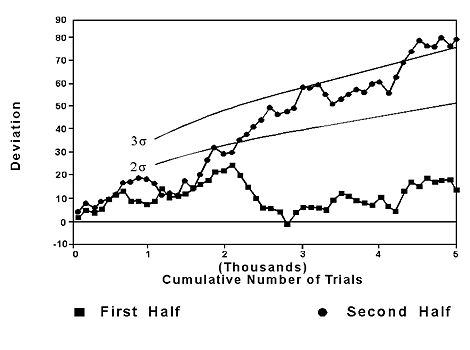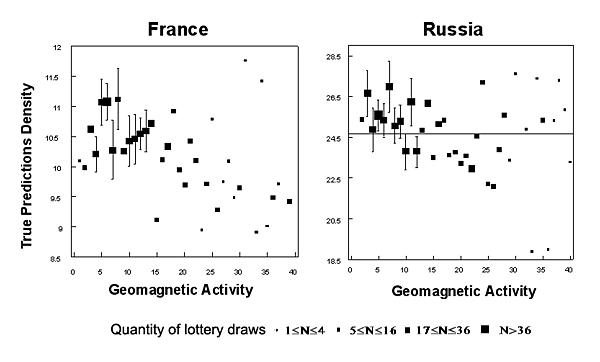| Scientific background In common life, we recognize Intuition as the ability to make correct predictions about events un-foreseeable in any other ways. These statements may be about stock trends, business deal results, lottery numbers, etc. For many years scientists have been trying to find out more about this phenomena. Scientists usually use more precise words like "precognition" instead of "intuition". However, "intuition" is more easily understood by non-specialists, which is why we use this term here
USING INTUITION TO AVOID DANGEROUS SITUATIONS W.E. Cox, in a well-known study (1956), analyzed the number of tickets sold for 28 passenger trains that crashed between 1950 and 1955. He found that the trains that crashed always had fewer people than similar trains on the same day of the previous week. The data was also analyzed for weather conditions, and number of sold tickets on the previous day, week, and month. Because every statistical result can be explained as random fluctuation, the author calculated the probability of accumulating the same statistics randomly. This probability was less than 1/100. In other words, we can say with 99/100 certainty that people really have - and use - their psychic intuition to avoid dangerous situations.
EFFECTS OF IMMEDIATE FEEDBACK The first published study proposing the concept of intuition training was written by Charles Tart (1966). He proposed that immediate feedback following the results of a guess could improve the human ability to make correct guesses, i.e. that it was possible to train intuition. In a series of theoretical and experimental studies published from 1960 to 1980, he established methods and strategies for intuition training. In particular, he noted that the following factors had a positive correlation with a subject's ability to train their intuition (Tart, 1977): (a) high (but not excessively high) motivation, (b) high general learning ability, (c) absence of specific conscious or (inferred) unconscious resistances to psi, (d) good ability to discriminate contents of the experimental field, … (f) good memory skills, (g) ability to quiet one’s mind; (h) non-attachment, ability to drop strategies that are not adaptive in spite of emotional investment in them … (j) ability to ignore sensory distractions. (When working with Intuition Tester it makes sense to take the above factors into account.)
SHORT-TERM PREDICTIONS USING "COMPUTER DICE" In 1988, D. Radin (1988) performed computerized research on the human ability to make short-term predictions. In these experiments, an operator attempted to predict the results of "tosses" of the computer equivalent of 6-sided dice. Data from more than 60,000 trials clearly showed that a human is able to achieve statistically significant results (greater than random). Even though the operator would be expected to achieve 10,000 hits randomly (60,000/6), in reality the operator made 10,163 correct predictions. The probability of this event was less than 1/20. Moreover, as soon as the "computer dice" became biased (i.e. one side had more chances to be selected than others), and without the operator being aware of this, the quality of predictions became even better. In this case, the operator guessed correctly 10,282 times, as compared to the 10,000 hits which he could achieve randomly. The probability of such an event was less than 1/1000. What that experiment showed: the stronger future event is determined by the current environment – the easer human intuition can foresee this event, even if human does not have any additional information. Intuitive predictions of various technically-related "crashes", stock-market trends, and various business opportunities, are, in fact, simple compensation for missed information about the current state. According to this research (Radin, 1988), these events can actually be much more predictable.
INTUITION TRAINING USING AUDIO-VISUAL FEEDBACK In 1995 M. Zilberman (1995/Jan) published the results of another series of computerized research studies. The results showed that intuition can be trained using immediate feedback. In his research, Zilberman used audio and visual feedback after each trial in a computer-generated random even/odd series. The overall statistics of 5100 trials showed a significant growth of correct guesses in the second half of the 100-trial sessions compared to the first half. The overall percentage of correct guesses was 51.88% (with the probability of these results occurring randomly less than 1/250). However, because of the "training effect", the accumulated percentage of correct guesses in the second halves of all series was 53.2% (with the probability of these results occurring randomly at 1/1000).
Deviation from the random level for the trials accumulated by first and
second The Intuition Tester, which you can download here, was designed on basis
of the software used in this research.
USE OF WEIGHTED FEEDBACK FOR INTUITION TRAINING Another research study of intuition training was published by Alan Vaughan and Jack Houck (2000). These scientists used a computer to generate random numbers and to accept the operator's guesses. However, the type of feedback used was different. They called it "weighted" feedback, describing it this way: "the closer is the target, the higher is the score". This study was performed by 12 operators who submitted 1800 trials each. The results confirmed the human ability to exceed the random level of correct guesses and to have this ability trained. The overall probability of achieving these statistics by chance was 0.015 (Z score =2.27, 1-tail). To estimate the training effect, the 1800 trials of each operator were divided into 3 groups of 600 trials and combined by all operators. For the first 600 trials, the overall deviation from the random was non-significantly negative (Z-Score=-0.26). For the second 600 trials group it was positive (Z=1.78, probability 0.04), and for the third 600-trials part it was very high (Z=2.42, probability <0.01). This study is a good illustration of the long-term training effect. As we can see, the operators' intuitive abilities changed from disappointingly below random level for the first 600 trials to very high levels for the last 600 trials.
USING INTUITION TO SELECT THE BEST BUSINESS OPPORTUNITIES A piece of very interesting research on the use of everyday intuition for decision-making was published by Dean, Mihalsky, Schroeder & Ostrander (1974). The research stated (as cited by [Vaughan and Houck, 2000]): "In testing company presidents, Douglas Dean and John Mihalsky found that precognitive ability was reliable indicator of financial success. Eighty percent of highly successful company presidents (who had doubled their company profits in five years) scored above chance on computerized precognition tests … The highly successful presidents said they were using their intuition to foresee money-making opportunities." This result is crucial, as it links science with everyday, real-life intuitive decisions.
LOTTERIES AND GEOMAGNETIC ACTIVITY M. Zilberman (1995/July) analyzed a ratio of winning tickets to total number of tickets sold in European numerical lotteries in the period between 1980 and 1989. He showed that this ratio is not constant and changes between months. These changes are similar in the lotteries of different countries and significantly correlate with the Ap-index of geomagnetic activity. This correlation is negative: the weaker the Earth's geomagnetic activity, the higher the ratio of winning tickets sold. This ratio directly correlates with the geomagnetic activity on lottery draw day, but not earlier or later. The probability of this result occurring randomly was <0.005.
Dependence of True Predictions Density in French and Russian lotteries on Geomagnetic Activity. (posted with permission of author)
CASINO PAYOUTS AND GEOMAGNETIC ACTIVITY In their research, D. Radin and J. Rebman (1996) analyzed values of payouts (the ratios between amounts won vs. amounts spent) in a Las Vegas casino. The better the players' intuition, the greater the payout. The authors showed that the value of payouts fluctuates significantly and correlates with geomagnetic activity and the lunar cycle.
SUMMARY OF FINDINGS a.Intuition can be measured in computerized and non-computerized experiments. b.It appears that intuition can be trained using audio-visual feedback. Training has an instant effect (Zilberman, 1995/Jan) as well as long-term benefits (Vaughan and Houck, 2000). c.Computerized intuition tests are good indicators of one’s everyday real-life intuition quality (Dean, Mihalsky, Schroeder and Ostrander, 1974). d.Intuition possibly depends on environmental factors; in particular, fluctuations in the Earth's magnetic field and the lunar cycle.
Cox, W.E. (1956) "Precognition: An analysis II." J.ASPR, Vol.30, pp.99-109 Dean, D., Mihalsky, J., Schroeder L. and Ostrander, S. (1974) Executive ESP. Englewood Cliffs, NJ: Prentice-Hall. Radin, D.I. (1988) Effects of a-priori probability on psi perception: does precognition predict actual or probable futures? JP 52, 187-212 Radin, D.I., Rebman J.M. (1996) Seeking PSI in the casino. Proceeding of the PA 39th Annual Convention. San Diego, California, USA Tart, C.T. (1966) Card guessing tests: learning paradigm or extinction paradigm? JASPR 60, 46-55 Tart, Ch.T. (1977) Toward Conscious Control on Psi Through Immediate Feedback Training: Some Considerations of Internal Processes, JASPR, 71, 375-407 Vaughan, A. and Houck, J. (2000) Intuition-Training software: a second pilot study, JSPR 64, 177-184 Zilberman, M. (1995/Jan) On the training of precognitive ability. JSPR 60, 289-292 Zilberman, M. (1995/July) Public Numerical Lotteries: An International Parapsychological Experiment Covering a Decade. JSPR 60, 149-160 Zilberman, M. (1996) What creates the deviations in public numerical
lotteries? The Parapsychological Association 39th Annual Convention, San
Diego, CA, 1996. |

